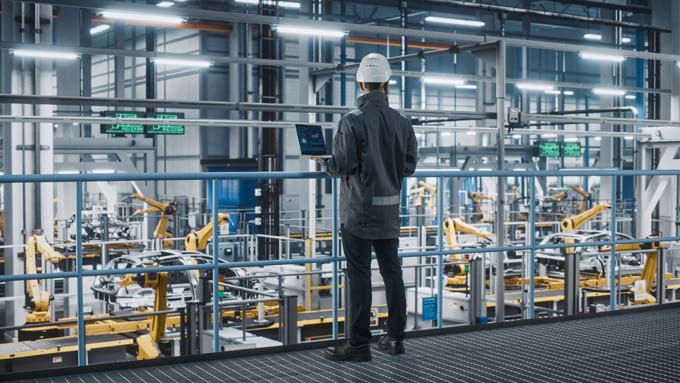Why don't we take better care of the economy's factors of production?
What would the economy be without the work of people and without natural resources from the environment? Both enable the economy to be what it is. Nurturing both therefore also means enabling a successful economy in the first place.

In former times the soil in the sense of arable land was regarded as the first factor of production of the economy, the second one was labour in the sense of human activities and the third one was capital, i.e. real and monetary capital. Today, the first two can be understood in a more comprehensive sense: the production factor soil became the "production factor environment", the production factor labour became the "production factor man".
human factor
If we are talking about people as a production factor, this should not be seen in a negative light. Man is the beneficiary of the economy, but on the other hand, through his work, also an important guarantor of it. Without his intellectual skills, such as innovation, or manual skills, such as the production of machines, the economy would not exist as it is today. People, as "human resources", are a very relevant source of the success of an economy. But why don't we take better care of people? Stress-related costs, as an example, run into the billions every year in Switzerland: Health costs and absenteeism costs (see e.g. reports by the State Secretariat for Economic Affairs or the University of Zurich). And every fifth accident happens as a result of overtiredness (see e.g. SUVA study).
Environment as a production factor
The environment as a factor of production includes nature with its basic resources of soil, water and air, but also energy. The economy draws all natural resources from the environment, such as the primary energy sources water, industrial raw materials, precious metals or agricultural raw materials. There is no company that does not use natural resources in some way; this applies to both industrial and service companies. But why don't we take better care of the environment as a production factor? On the one hand, we exploit the environment and extract resources as and when we please. On the other hand, we pollute it with emissions; and above all, we litter everything with waste: the soil, the oceans, the atmosphere. Here, too, the environmental costs in Switzerland run into the billions every year (see, for example, reports by the Federal Office for the Environment).
Analogies between humans and the environment
There are interesting analogies in problems of the human factor of production and in problems of the environment as a factor of production. Here are a few examples (for more, see "Economy for the good of all? The art lies in balance", ISBN 978-3- 9521520-3-4):
a) Humans: The human cardiovascular system cannot always only produce. It also needs rest periods. If these are neglected, it can collapse. Artificial respiration can be an immediate life-saving measure. Environment: In Switzerland, Lake Sempa collapsed in the mid-eighties as a result of the steadily increasing production pressure in agriculture. All the fish died; the lake was then aerated and oxygenated for years. The ecosystem in the Gulf of Mexico is now dying, just like Lake Sempach did back then.
b) Humans: In our digestive system substances are decomposed and transformed into new substances that the human body needs and absorbs. If we allow this system to digest too much "indigestible" material, it becomes spoiled and reacts with digestive problems. Environment: In the past, we simply let substances such as waste seep away or bury them. However, the soil cannot digest them, i.e. break them down and produce new substances for the ecosystem. Society must now correct these disturbances, e.g. within the framework of remediation of contaminated sites costing billions of euros.
c) Humans: Burnout is understood as an imbalance in humans when they consume too many resources and, on the other hand, gain too few resources themselves. This leads to a deficit of resources and to a kind of total exhaustion; the person burns out. Environment: On a collective level, we are also burning out the earth: we are taking more resources (e.g. fossil fuels and raw materials) than the earth can give us. The ecological footprint in many industrialized nations is larger than three earths.
We do not know how to deal "economically" with natural or human resources - and this in a world with so many economic specialists?
This is where medicine comes in: doctors are responsible for people's symptoms of illness (e.g. burnout). The task of medicine is to care for and heal people; also to reintegrate them into the economic and working world after an illness or accident. Medicine thus becomes a relevant area of social management: it cares for and maintains the human production factor in such a way that it is well.
But environmental protection also comes into play. It repairs damage (e.g. collapsed lakes, old landfills) and shows how the production factor environment could be cared for in such a way that the environment could continue to function as the basis for our lives and for the economy for a long time to come. This is a different view, especially if one continues to think of environmental protection from operational environmental management to cross-operational ecosystem management.
What do we need in the future?
We need a change of philosophy in the economy; in both areas of social and environmental management. Let us take a look, for example, at the origins of soil as a production factor. For a long time, soil was regarded as the basis of agriculture to be used extensively (see, for example, three-field agriculture with fallow land). In the course of progress, agriculture had to produce more and more intensively until the soils were depleted, compacted, eroded or full of pollutants (or the lakes collapsed). Only then, with organic farming, there was a change of philosophy: one started to "care" for the soil, because only a well-kept and healthy soil can be an economic and successful basis for agriculture. The same applies to the production factor environment and the overall economy.
But we also need a change of leadership in the economy: In the future, managers are needed who put people and the environment at the centre, i.e. who cultivate social and environmental management in relation to a company in order to make successful quality and economic management possible in the first place. Or to put it another way: What could the economy learn from medicine and environmental protection (see examples a-c above)? For it is the symptoms of illness and the environmental problems that send us clear signals that something is wrong. And the rising costs of health and the environment are also a sign. Why don't we take better care of people and the environment, also for the benefit of the economy?









